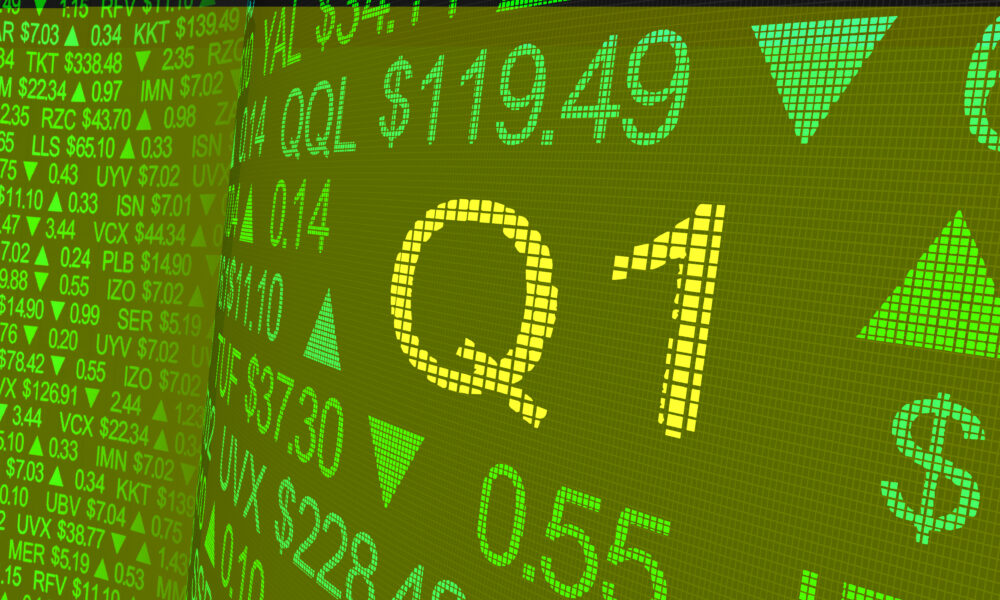Analysts remain bullish on Las Vegas-based casino operators after the latest releases of first quarter earnings. This is despite investor concerns over whether there will be a recession sometime this year.
Nevada’s gaming revenue and visitation have been running behind their 2024 pace. GDP hitting negative territory during the first quarter and the impact of tariffs have also raised questions about the macro economy.
Not so fast, declare casino executives and gaming analysts in the wake of the first-quarter earnings of MGM Resorts International, Caesars Entertainment, Boyd Gaming, and Red Rock Resorts, among those major Las Vegas-based players who have released them so far. MGM and Caesars both reported first-quarter EBITDA beats, with Las Vegas and regionals coming in ahead of expectations.
Bank of America analyst Shaun Kelley’s headline read: “State of the consumer: Not seeing meaningful cracks” in his note to investors last week.
“Overall, it sounds like management teams aren’t seeing consumer softness and Caesars has strong forward bookings in Vegas,” Kelley said.
Kelley noted that MGM called out a slightly shorter booking window in Las Vegas amid uncertainty, but room revenue is still materializing as expected, with April a record hotel month. Meanwhile, Caesars noted that forward bookings in Las Vegas look “quite strong” and solid regional trends have continued into April.
“First-quarter results and consumer comments were better than feared, helped by strong margins/cost control offsetting a tough comp against last year’s Super Bowl,” Kelley said. “Our estimates are largely similar (+1% for MGM and -1% for Caesars) and we maintain our neutral ratings.”
Caesars reported first quarter revenue/EBITDAR of $2.79 billion/$884 million versus the Street’s $2.79 million/$878 million. Las Vegas revenues of $1.003 billion were 2% below Bank of America’s $1.025 billion, while EBITDA of $433 million was largely in line with well controlled costs, Kelley said.
In regionals, EBITDA of $440 million was in line with Bank of America’s $439 million and above the Street’s $431 million.
“Regional demand has been resilient and we think EBITDA can grow year-over-year in 2025 as renovations at New Orleans and the permanent facility at Danville (Virginia) are offsetting competitive pressures,” Kelley said.
Caesars Digital continues to impress, with EBITDA of $43 million ahead of the Street’s $38 million, Kelley said. Igaming revenue was up 40% year-over-year, ahead of the market’s 27%, and management highlighted that igaming net gaming revenue is tracking up +70% in April.
“Online sports betting handle was down 7% year-over-year in the first quarter, but improved from -15% in tdhe fourth quarter,” Kelley said. “The handle declines are intentional, as Caesars increases focus on retention and profitable online sports betting customers. Overall, promo was 17% across igaming/online sports betting, much lower than the industry’s 30% to 35%.”
MGM reported first-quarter revenue/EBITDAR of $4.28 billion/$1.181 billion versus B of A’s $4.27 billion/$1.14 billion. Las Vegas EBITDA of $774 million beat its $760 million driven by solid cost control.
“April was a good month in Vegas, with record room revenue, and MGM is optimistic that events and programming in the second quarter can help keep demand stable amid macro uncertainty,” Kelley said. “MGM China EBITDA of $286 million beat our $257 million, driven by strong margins. The first quarter benefitted from seasonality and we expect normalization to the mid-20s for the year.”
On digital, BetMGM’s first-quarter update was better than expected, with online sports betting net gaming revenue up 68% year-over-year (versus gaming revenue up 21%) driven by a material pullback in promo, Kelley said.
MGM raised its budget for the Osaka development in Japan and now expects $600 million to $700 million of annual equity contribution over the next four years versus. $500 million prior, Kelley said. “Overall, we tweak our estimates +1% and reiterate our Neutral rating.”
In his note to investors, John DeCree, director of equity research at CBRE, said he hosted a chat Thursday with MGM Resorts CFO Jonathan Halkyard on the heels of solid first-quarter results that exceeded expectations against very difficult comparisons.
“Overall, we came away from our chat more confident in MGM’s near-term outlook and ability to operate through a potential recession, supported by recent capital investments, the Marriott partnership, the EBITDA enhancement program, and strong forward group booking pace,” DeCree said.
CBRE estimates that Bonvoy customers comprise about 8% of MGM’s room nights and at a higher room rate and on-property spend than the transient customers they’re replacing. Given the early success, MGM is exploring ways to expand this partnership and recently extended the loyalty benefits to group and convention customers as well.
“While many investors remain concerned about the growing probability of a recession, we believe MGM and Las Vegas are much better positioned to weather a storm than prior cycles,” DeCree said. “There is far less hotel room supply growth (about 1.5%) in Las Vegas today than in the Great Financial Crisis, and there are more demand drivers, including a more mature convention industry, a larger live entertainment draw, and a strong sports tourism market. In addition, MGM now has some 185 million Bonvoy members, as well as its omni-channel network with BetMGM, to help fill rooms with quality customers in the event aggregate demand for Las Vegas declines in a potential recession.”
DeCree is maintaining the Buy rating with a $48 price target for MGM shares.
MGM has financial flexibility to support its balanced strategic initiatives that include: targeted capital investment into its existing portfolio; improved operational discipline and efficiency; returning capital to shareholders; and pursuing attractive growth prospects across major new gaming markets and digital channels, DeCree said.
“Despite market volatility and political turbulence, MGM’s business is built to endure,” DeCree said. “We see particular value creation in the coming years, as MGM executes on its development pipeline and digital gaming initiatives both domestically and internationally. Meanwhile, MGM remains ready and willing to defend its stock, once again ramping up share buyback activity to capitalize on severe market dislocations. We see plenty of balance-sheet capacity for MGM to remain an opportunistic buyer of its stock while funding its growth initiatives.”
When it comes to Caesars in Las Vegas, DeCree wrote that the $433 million of EBITDA met expectations, reflecting a flat year-over-year performance despite a challenging comparison to the 2024 Super Bowl.
Slight declines in occupancy and average daily room rates were offset by better slot volumes and cost controls, DeCree said.
“Although the economic outlook due to potential policy changes in the U.S is uncertain, management has enough visibility to remain optimistic for modest EBITDA growth in Las Vegas this year,” DeCree said. “Caesars continues to see positive forward indicators from both leisure and group customers. However, the group and convention outlook is particularly strong for Caesars with 2025 shaping up to be a record year (with greater than 20% of room nights), followed by what should be an even better year in 2026. Management also reiterated that it has some additional levers to pull, such as tapping deeper into its database.”
Caesars Digital reported $43 million in EBITDA, a significant increase from $5 million in the first quarter of 2024, with flowthrough exceeding the company’s 50% annual target, thanks to cost controls and rationalizing reinvestment levels, DeCree said.
Management estimated hold-normalized EBITDA would have been about $65 million if not for customer-friendly NCAA outcomes. Sports handle declined 7% year-over-year, due primarily to the rationalized promotional strategy, DeCree said.
“However, this is a notable step toward normalization after the fourth quarter of 2024’s steeper 17% decline. We continue to expect a return to growth in sports handle later this year as the company anniversaries the implementation of its new targeted promotional strategy.”
Despite the decline in handle in the first quarter, sports net gaming revenue increased 8.7% year-over-year. On the igaming side, 28% volume growth and more efficient promotional activity led to 53% year-over-year growth in net igaming revenue, DeCree said.
Igaming is also benefiting from its multi-brand strategy, with the new Horseshoe app contributing 7% of segment gaming revenue. The outlook is even brighter, with April igaming surging nearly 70% year-over-year, building on an already-strong base of 50% growth in the second quarter of 2024, DeCree said.
Caesars reported $440 million of regional EBITDA, up 2% year-over-year and modestly beating expectations. Results reflect mostly stable same-store trends, contributions from new properties in New Orleans and Virginia, offset partially by weather disruptions, one less operating day, and competitive pressures in some markets.
In its first undisrupted month, Caesars New Orleans generated over $16 million of EBITDA in March, providing some insight into what a normalized annual run-rate could look like ($192 million), DeCree said.
“Although the fear of a recession remains elevated, Caesars confirmed near-term trends suggest no major change in consumer behavior so far. More importantly, the strong group and convention outlook provides additional comfort for earnings stability in the near and medium term. With capex tapering off, the core business remaining stable, and digital profitability ramping, Caesars is finally on the cusp of entering cash flow harvest mode. Management emphasized that nearly all free cash flow will be allocated to debt reduction, while remaining opportunistic with share repurchases.”


